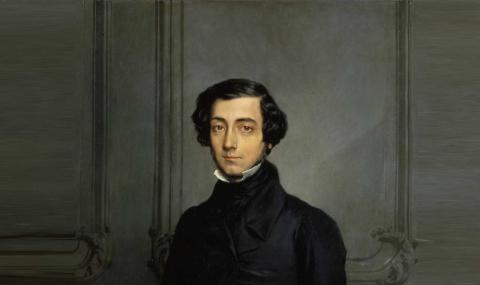There is nothing more prodigal of wonders than the art of being free . . . but nothing is harder than the apprenticeship of liberty. —Alexis de Tocqueville, Democracy in America
In 1831, the French aristocrat and historian Alexis de Tocqueville toured the United States for nine months. Ostensibly, he came to study our prison system for the new French King. But really, he wanted to answer the burning question of his life” “Why did democracy take root in America but fail in France?”
This question was so important to Tocqueville because most of his family had been executed during the Reign of Terror following the French Revolution. Throughout his life, Tocqueville watched France lurch from one extreme form of government to another—never quite able to give up the democratic ideals of the Revolution, but never able to use those ideals to create a stable democracy.
The Revolution had made it clear that democracy is not the default position for human societies. It does not spring up automatically wherever people are not being actively oppressed by emperors and kings. It takes something else. Tocqueville’s grand tour, and the resulting book Democracy in America, are perhaps the best attempts that anyone has ever made to figure out what that “something else” could be.
What Tocqueville saw in America were habits—he called them mores—that made democracy seem to its citizens to be the inevitable way to make important decisions. He saw these everywhere. School children took votes to determine the result of games, people used parliamentary procedure to run church meetings and reading groups. And people actually seemed to enjoy talking to each other about politics.
This was completely different from the world that Tocqueville knew, where someone who wanted to change anything had to follow a time-honored set of procedures: start a secret society, swear oaths of fidelity, throw up barricades, riot in the streets, and then hope that people came in from the countryside to join the cause.
These strategies produced major revolutions in 1789, 1830, and 1848, but they never produced democracy because revolutions alone cannot create the culture of persuasion necessary for democracy to thrive. Getting rid of a king is much easier than getting rid of a culture that treats political disagreement as a problem that can only be solved by force.
Tocqueville ultimately concluded that Americans succeeded where France failed because their mores supported a culture of persuasion, whereas the French had only developed a culture of opposition and force. “With consciousness of strength comes violence as the first idea to come to a party or individual,” he wrote. “The idea of persuasion comes only later; it is born of experience.”
Tocqueville gives us an extremely useful vocabulary for discussing our political culture at different points in our history. When our democracy has succeeded, we have had a culture of persuasion: people have seen political opponents as people to be persuaded and have engaged in the kinds of actions that make persuasion possible: discussion, debate, negotiation and fair elections whose results are accepted as legitimate by all parties.
When our democracy has failed, it has failed because we have had a culture of opposition—a political environment in which two sides each see each other as enemies to be vanquished. In such cultures, people do not argue to persuade each other to their point of view, but to recruit others to their faction and convince them to hate the other side. This happened in 1860, and the result was the Civil War.
We aren’t there yet. But we are getting much too close for comfort. The indicators from the 2016 election are not good. A Pew Research study, for example, found that nearly two-thirds of politically engaged voters who express a party preference say that they are afraid of the other party. Another survey in 2017 found that almost 60% of the people in our country dread having Thanksgiving dinner with their families because they did not want to face political discussions with their relatives.
Statistics like this mean something. They indicate that we are rapidly transitioning from a culture of persuasion to a culture of opposition--or a culture in which political rhetoric no longer has the goal of persuading people to adopt a position, but of persuading them to join a side and finish off the opposition for good. Tocqueville knew this kind of political culture well. It is the one that thrived behind the barricades.
